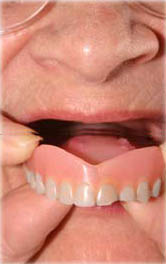Dentures

If you are a new denture wearer, you may notice:
- that the dentures feel large or bulky in your mouth
- that your lips feel pushed forward
- a gag reflex
- increased saliva
- a change in your speech pattern (especially with words starting with F or S)
- sore spots in your mouth.
These are normal reactions and generally disappear as soon as you (and your mouth) become used to the new dentures. This could be a few hours or a few days.
Well-fitted dentures should not interfere with normal functions, including talking, eating, and chewing.
Caring for the dentures:
Dentures, when cared for properly, generally last five to ten years. The following daily routine can help keep dentures (full or partial) clean and your mouth healthy:
- Rest your mouth – remove dentures at least a few hours each day.
- Store dentures in a container filled with water so they don’t dry out.
- Never try to repair a broken denture – call the dentist.
- Label dentures and denture cup, especially in a shared living/ hospital/ long-term care environment.
To clean your dentures:
- Rinse your dentures in water to get food particles out.
- Do not use hot water to clean dentures.
- Rinse over a sink filled with water to prevent breakage if they are dropped. Placing a washcloth at the bottom of the sink will provide padding.
- Clean your dentures by brushing daily and soaking. Use a soft-bristled toothbrush or one made for dentures.
Putting dentures in:

- Apply adhesive if necessary – it may be trial and error for a few days until you find the amount of adhesive that works best.
- Rinse your mouth.
- Press your denture firmly in place, hold and bite down.
Removing the dentures:
For upper dentures, place your thumbs or fingers at the top of your denture, along the top area of the cheeks where they meet the gum tissues. Push down gently until the denture is loosened and it can be easily removed.
For lower dentures, place your fingers on each side of the denture; slowly pull on the denture while rocking it gently side to side.
Assisting an older adult with denture care:
Caregivers should follow the steps outlined above to help an older or semi-dependent adult with dentures. This is an important part of the oral hygiene routine – and a fresh feeling mouth will help provide the patient with comfort and confidence. Remember, a regular visit to the dentist is still necessary, even for people with dentures.
If the individual has natural teeth remaining in the mouth, the normal daily oral hygiene routine should still be followed with these teeth.
Published with permission from Smiles For Seniors … an oral health initiative of the Ohio Dental Association.
For more information:
Go to the Dental and Oral Health (Seniors) health topic.